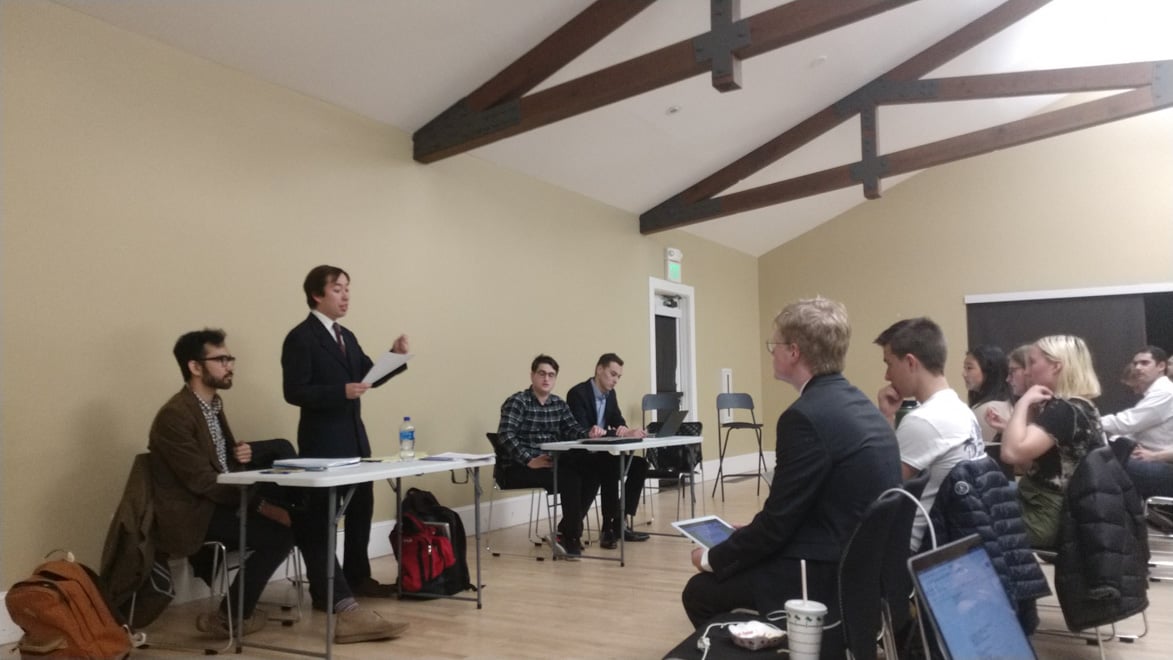Students filled the Black Community Services Center on Thursday evening to hear a healthcare reform debate between four student groups: Stanford College Republicans (SCR), Stanford Democrats, Stanford Young Democratic Socialists of America (YDSA) and The Stanford Review. The debate, moderated by Stanford in Government (SIG)’s Public Policy Reform group, covered issues surrounding the Affordable Care Act, Medicare for All and state legislation.
“I think this was a great experiment,” said SIG chair Olivia Martin ’19. “We’ve never tried to debate in this format with four teams. It captured how complex and nuanced an issue out there is and how you can have more than just two perspectives on what the best healthcare system is.”
Debaters featured members with a wide range of political beliefs — along with free In-N-Out for debate attendees. While vice chair of YDSA Jacob Kuppermann ’20, a Daily staffer, advocated for the Medicare For All plan, Andrew Friedman ’20, editor-in-chief of The Review, claimed a competitive market would make healthcare more affordable. David Jaffe ’21, financial officer for the Dems, called for a combination of market and government solutions, and SCR Board Member Stephen Sills ’22 — who is also running for Undergraduate Senate — stressed that universal healthcare is a promise the government cannot keep.
“The promise of healthcare as a right, though, isn’t really anything new,” Sills said. “It’s a promise that Vladimir Lenin promised to his people in the USSR in 1920.”
Participants each had three minutes at the beginning of the debate to enunciate their positions and then faced questions posed by moderators Emma Bates ’22 and Maia Brockbank ’21. During this time, they were allowed to ask questions and respond to each other, but Bates and Brockbank made it clear that ad hominem attacks were strictly forbidden. The final portion of the debate featured questions from the audience and final statements.
In the opening statements, participants were asked to talk about their ideal healthcare system and how that system would deal with cost, coverage and quality of care. Each debater expressed that the current system is broken, with Kuppermann jokingly stating that agreement between the groups proves that, spurring laughter.
“The system is clearly not working,” Kuppermann said. “I mean, if the Democratic Socialists and The Review can agree on that, it should be clear that the system is not working.”
When asked whether quality, cost and coverage was the most important metric to a healthcare system, each participant stated all three were important aspects, but Kuppermann answered coverage, Sills and Friedman stressed quality and Jaffe discussed cost.
In the final question from the moderators, participants were asked to single out the biggest shortcoming to their proposed plans. While Kuppermann, Friedman and Sills each discussed the legislative barriers associated with their plans, Jaffe explained that it would take time to see the results of market-oriented solutions coupled with government regulation.
“It will take some time to see the fruits of these solutions,” Jaffe said. “It’s not as cool, it’s not as sexy and it’s not as quick as Medicare for All or similar solutions. So it will take some time … but we will see improvements.”
Following the debate, SCR president John Rice-Cameron ’20 told The Daily that he thought Sills eloquently presented a conservative case for American healthcare policy.
“The most important point we were trying to address here was not necessarily the impracticality of these big government solutions, like you know, Medicare for All and Obamacare,” Rice-Cameron said. “But what Stephen showed tonight was that fundamentally these solutions are not just impractical but they’re immoral — it’s the immorality of stealing from somebody and redistributing wealth.”
Stanford Democrats President Gabe Rosen ’19 agreed with Jaffe’s positions and commended all the participants on their performance.
“David did an excellent job representing a viewpoint within the Democratic Party that really does touch on the key issues of how we can make the framework that we’re operating in as efficient, yet also, as humane and compassionate as possible,” Rosen said. “And I think that all four debaters did a fine job of putting forth their viewpoints tonight.”
Around 30 to 40 attendees and the debate participants stuck around after the debate to continue discussions around healthcare policy, which Martin noted as reason to hold debates more frequently. During SIG’s last debate, which took place in March 2018, SCR and the Stanford Democrats discussed on the Congressional Tax Cuts and Jobs Act of 2017.
“I think it was a great start at starting a conversation — I’m already seeing right afterward that all these people are staying after just to talk about what they just heard,” Martin said. “So I’m glad we started this conversation on campus.”
Contact Patrick Monreal at pmonreal ‘at’ stanford.edu.
